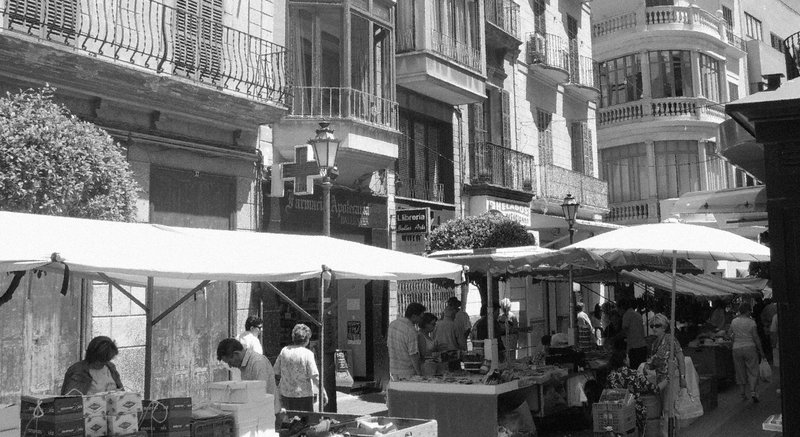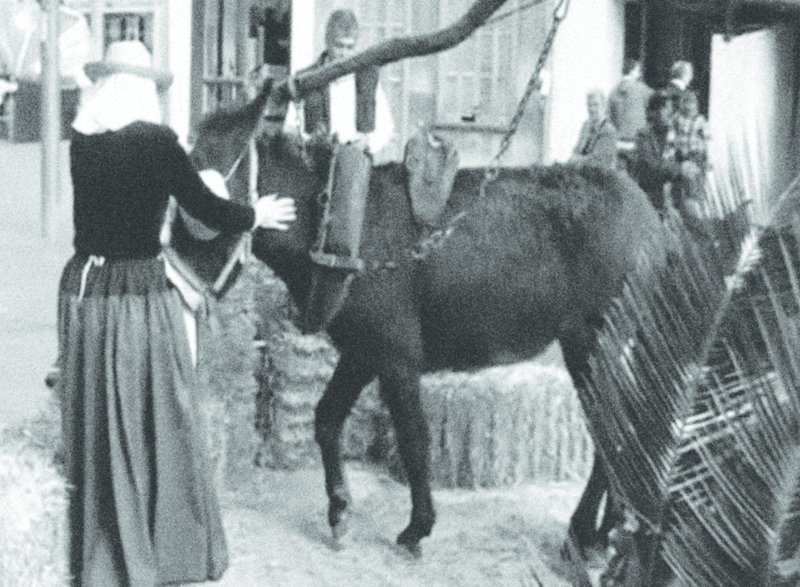A casual delight
Coincidence provides this Edwardian writer with a chance to chronical the celebration of Inca's festival on the island of Mallorca
Women Travellers in Catalan Lands
Joining the stream of people, we entered the town, to discover what spectators less accustomed to crowds would long ago have discovered – that by some lucky chance we had come to Inca on the great day of its year – the annual feria. All the ways leading towards the centre of the town were lined with empty vehicles and up-tilted carts, and in the narrow streets the owners were promenading.
The fair was largely a business matter. It presented few of the elements of entertainment common to that of an English country town. The only thing in the way of amusement that we saw was a merry-go-round, and that was being quietly ignored.
One interesting feature was that each street held its own species of merchandise. In one, clothing and brightly-hued foot-gear were sold. Another was wholly given up to sweet stalls, whose principal article was a species of white confection composed apparently of chopped almonds and sugar. That it was good the myriads of bees that were tasting its sweetness bore testimony. In yet another street we had to walk between a long double row of women seated on rush-bottomed chairs, each bearing in her lap an earthenware cooking-pot full of a puzzling commodity that had something of the appearance of crimson threads. It appeared to be the only commodity they had to offer, and I own we never succeeded in discovering what it was.
The square in front of the principal church was the centre of attraction for us. On one side the ground was covered with a fine display of native ware. Jars, and plates, and pots, and vases, in the greens and yellows and browns that look so tempting and are so cheap. The touch of vermilion, artistically so valuable to the busy scene, was given by the huge sacks bulging with scarlet and orange sweet peppers that form such an important part of Majorcan food.
Two maimed beggars, the first we had seen in the island, were hobbling about reaping a harvest; and, raised on a little platform, a travelling dentist was extracting juvenile teeth free; to the satisfaction of certain thrifty parents, and to the visible distress of their offspring.
Just below the square was the cattle-market; and on its outskirts we saw, for the first time, a peasant clad in the native male dress that unfortunately has become so rare. The jolly old fellow wore the extremely baggy blue cotton pantaloons, the short black jacket, and wide-brimmed hat that make up so distinctive a costume.
A threatened shower and an actual thirst gave excuse for seeking refuge in a cafe. Most of those we glanced into were crowded with peasants, and we hesitated about forcing our way in. Finding at last one that looked more exclusive , we entered and seated ourselves at one of the little tables set under the overhanging tissue-paper decorations.
The Boy and I wanted wine, the Man chose cognac. The active waiter quickly served us with huge tumblers of red wine set in saucers; and placing before the Man a bottle of brandy in which were immersed spiky herbs, left him to help himself. The wine was rich and fruity, the liqueur the Man declared delicious; and while the rain, which was now falling in earnest, pattered down, we sipped and watched the passing life of the street.
Just across the way, at the side entrance to a flourishing baker's shop, two women were frying dough-nuts in a big pan of boiling oil. The elder woman, scraping a segment of batter from the full basin at her elbow, deftly twisted it round her finger, then threw it into the oil, from which a minute later her assistant lifted it out with a long-handled spoon, transformed into a crisp golden ring.
The shower had ceased, the sun was again shining out, and there was much to see; so we paid for our drinks and departed.
“Fourpence!” said the Man, as he pocketed his change. “A penny each for the wine and twopence for the liqueur! It's enough to drive one to drink!”
The one drawback to the complete enjoyment of the fair was the mud. The previous night had been wet, and the streets were inches deep in it. To walk about in mud three inches deep is fatiguing, so we decided to take the train that was due to leave Inca at one o'clock, instead of waiting for that leaving at four.
It was a merciful fortune that guided us, for the one o'clock train took three hours to cover its twenty miles. Yet the scenery, with its grey-green olive plantations set against a background of beautiful mountains and enlivened with quaintly attired olive-gatherers, was so fine that we did not tire of feasting our eyes upon it..
Our companions on the return journey were mainly men – Palma merchants probably, who had visited the fair as buyers and were anxious to return with the greatest possible expedition.
When those who were so adventurous as to wait until the later train would get back to town, or whether they ever reached it at all, history does not relate.
Mary Stuart Boyd
Mary Stuart Boyd (1861-1937), née Mary Kirkwood, was a journalist and novelist born in Glasgow and chiefly educated at home. In 1880 she married the artist Alexander Stuart Boyd, with whom she had a son in 1887, and three years later they moved to London, where he worked as illustrator for Punch and she began to write reviews, sketches and stories for such widely circulated publications as The Observer or The Morning Post. In 1920 the Boyds settled for good in New Zealand, where she would become the first President of the League of New Zealand Penwomen. Boyd's literary output also includes two interesting travel books that reflect the calmed ethos of the Edwardians who travelled abroad. The first one, Our Stolen Summer (1900), chronicles the around-the-world journey that the Boyds made in 1898, whereas The Fortunate Isles (1911) narrates their bucolic sojourn in the Balearics Islands between October of 1909 and April of 1910. Though based in Mallorca, they also made trips to Menorca and Eivissa during which they painted and sketched places still unfamiliar to the average British tourist. One of these was Inca, a municipality located in the centre of Mallorca that they were fortunate to visit during its annual fair. Popularly known as Dijous Bo (“Good Thursday”) among the locals, this fair is held in early November and dates back to the sixteenth century or even earlier. Boyd, as the excerpt illustrates, could ascertain how crowded it was with vendors and peasants from all over the island. Today, even though Inca has lost the old agrarian atmosphere captured by Boyd, boasting instead important shoe firms that export worldwide, its citizens continue to celebrate their fair as enthusiastically as ever.




